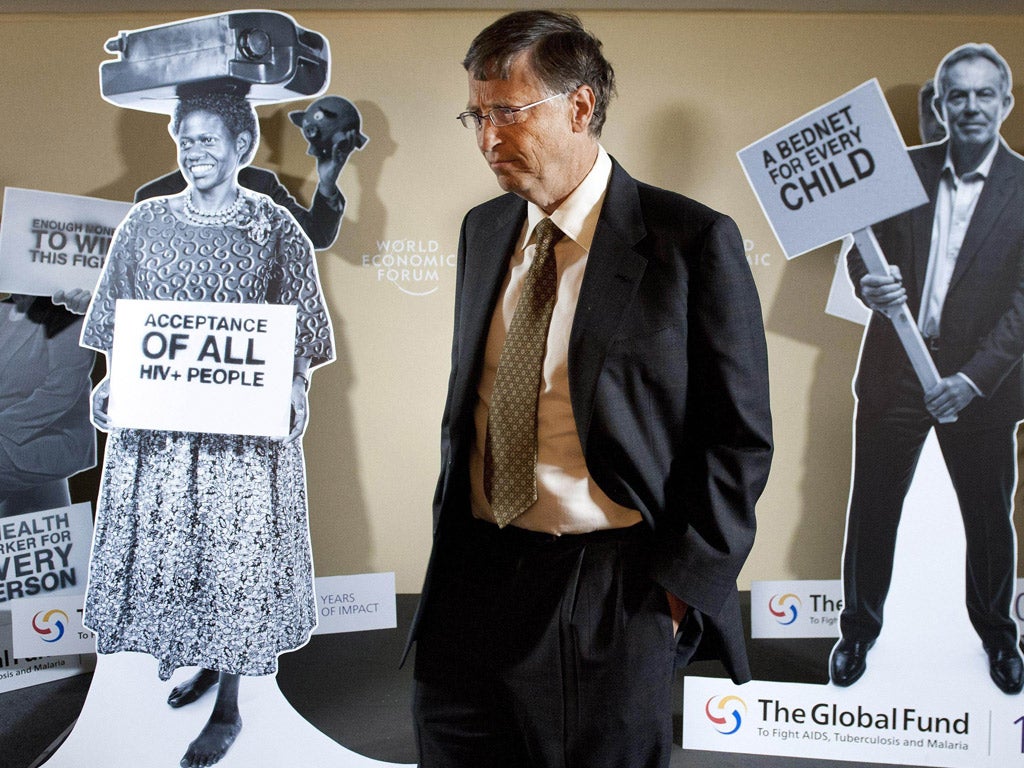Your support helps us to tell the story
From reproductive rights to climate change to Big Tech, The Independent is on the ground when the story is developing. Whether it's investigating the financials of Elon Musk's pro-Trump PAC or producing our latest documentary, 'The A Word', which shines a light on the American women fighting for reproductive rights, we know how important it is to parse out the facts from the messaging.
At such a critical moment in US history, we need reporters on the ground. Your donation allows us to keep sending journalists to speak to both sides of the story.
The Independent is trusted by Americans across the entire political spectrum. And unlike many other quality news outlets, we choose not to lock Americans out of our reporting and analysis with paywalls. We believe quality journalism should be available to everyone, paid for by those who can afford it.
Your support makes all the difference.To the untrained observer Davos man and Davos woman might look the same as ever: well-fitting clothes, mobile phone clamped to ear, iPad affixed to finger, a confident "master-of-the-universe" gleam in the eye.
But something has changed inside the delegates of the World Economic Forum this year. A powerful sense of social responsibility has been kindled in their hearts. The message of the global "Occupy" protesters, and all those jibes about the runaway wealth of the "1 per cent" have not, contrary to popular assumption, fallen on unheeding ears. Capitalism is about successful adaptation, and these delegates have duly adapted to the new environment. The evidence? Two themes have run through the first two days of this year's summit: frugality and philanthropy.
First the frugality. Happily, the British have been world leaders in this area. To bang the drum for the London Olympics, the Diamond Jubilee and the ailing UK economy, the British delegation held a tea party at Schneider's café on the promenade. The event was described by the mayor's office as "frugal and efficient". It did however have the British model Lily Cole thereto provide some glamour.
And it's not just governments that are attuned to the need to cut out the excess at a time when global unemployment is heaped as high as this year's record snowfall in Davos.
An Indian billionaire (one of the estimated 70 in attendance this year) said that he hoped this year's meeting wouldn't be "just about glamour and people having a big party." And indeed the after-conference soirées, so far, are reported to be more sober than in previous years.
Philanthropy has been big too. The Ukrainian steel pipe billionaire, Victor Pinchuk, held his annual philanthropy round table this week, chaired by Chelsea Clinton. Sadly, Tony Blair, who was to attend, apparently couldn't make it because of commitments in the Middle East. The Irish telecoms magnate, Denis O'Brien, has tried to encourage investment in Haiti. "Corporations need to engage in giving a chunk of their profits to social issues," Mr O'Brien urged.
Bill Gates lead by example, announcing a $750m contribution to a global fund to eradicate malaria.
Britain's International Development Secretary Andrew Mitchell was mingling with the well-heeled. Did he think the global rich were dipping their hands into their pockets sufficiently deeply? "They're doing a lot, but I want them to do more. That's why I'm here" he said.
But there can be contradictions when it comes to philanthropy. Daniel Och, founder of the New York hedge fund Och-Ziff, told me that charitable giving is important to him and his family. But the hedge funds are reported to be playing hardball over the Greek debt write down, something that, some say, is serving to extend the misery of the Greek population.
There are blind spots too. How about requiring the wealthy to pay more in tax, rather than simply urging them to make donations to worth causes? "If you change the law we will pay the taxes," sniffed David Rubenstein, of private equity firm Carlyle Partners.
Self-interest has not been entirely extinguished then. And it is notable that, while there has been a good deal of talk about the dangers of growing inequality, there has much less discussion about what to do about it.
And frugality? Well, it's all relative here in the Swiss Alps. CNN estimated the average cost per delegate is $40,000; registration $20,000, flights $6,000, transfers $4,000, food $2,000, hotel $3,000. And there is plenty of conspicuous wealth on show. The so-called "oligarch's wives" were in attendance looking slightly lost in the conference centre in their fur coats and snow boots.
The helicopter hiring stall was doing decent business. "How much to fly to Zurich airport," I asked. "Between $5,000 and $9,000" replied the lady. "Why the difference?" "It depends whether you want a single or a double engine." Perhaps the Davos billionaires ought to charter a single and give the saving to charity. Frugality and philanthropy combined in perfect Davos-style.
Subscribe to Independent Premium to bookmark this article
Want to bookmark your favourite articles and stories to read or reference later? Start your Independent Premium subscription today.

Join our commenting forum
Join thought-provoking conversations, follow other Independent readers and see their replies
Comments